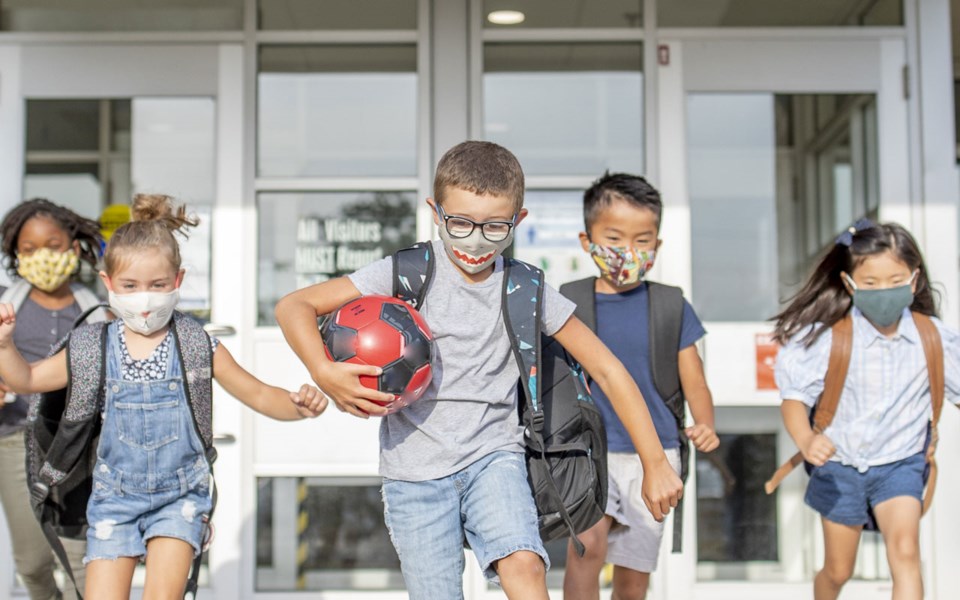For Whistler Secondary School (WSS) Grade 12 student Israel De Real, contributing in person to the spring play was a bright spot in his school calendar.
Having already earned all the credits he needs to finish school, serving as promotions manager for Objection! Disorder in the Court was a social connection.
“We’ve all been impacted in some way by this pandemic—whether it was through school, or isolation or family loss and other tragedies,” he said. “So I found solace in the fact that we were able to act as if everything was normal … Although this is my only course, I feel a sense of purpose, a sense of normalcy. I feel invited. I feel welcomed every time I come into this space and I reciprocate that to the others.”
While the vaccine rollout is underway, bringing with it a more optimistic outlook on the future, Sea to Sky students still face the last quarter of their school year with ongoing COVID-19 restrictions.
To that end, those in-person connections—like the WSS school play—continue to mean a lot to kids. But experts say there are steps parents can take to help ensure mental wellbeing too.
Tanya Broesch, an associate professor in the Department of Psychology at Simon Fraser University and a developmental psychologist, said one important element of structure parents can control is routine.
“We know routines are really important,” she said. “That was one thing I encouraged parents to do throughout the pandemic is create a routine with flexibility. Let the kids guide it and choose, ‘This is going to be math hour. How will we do our math hour?’”
One other simple suggestion that can extend beyond the pandemic: “Spend some time every day enjoying something with your kids.”
“When kids come home from school, it’s not as important to have the perfect meal or a perfectly clean house—put those things aside if you can and spend 15 minutes or more just enjoying them and what they’re doing,” Broesch said. “Play a game, play a video game, go for a walk. Even if you’re stressed, if kids see you’re enjoying their presence, that’s really important.”
For Mary MacDonald—who might be best known in Whistler as a local poet and writer, but also works as a paediatric psychologist—the fear kids are feeling around the pandemic isn’t entirely unprecedented.
“I was talking to someone the other day about what was happening when we were kids that we still remember,” she said. “What was happening was the Cold War. My parents and their friends were talking about nuclear war all the time. I was four or five and my parents were very involved in anti-nuclear protests. I was one kid of seven and [we asked], “Are we going to die tomorrow, mom?”
A similar fear of death has pervaded her Zoom sessions with young patients in the last year as well. “Kids were asking me, ‘Are my parents going to die?’ That’s pretty impactful for a child … That was huge for me in the beginning, just to hear every one of them say it,” she said.
The struggle, of course, is how to be reassuring when you can’t say with certainty that everything will be OK, she added.
“In an interesting kind of way, what we’re teaching children is how to live with uncertainty,” MacDonald said. “We live with uncertainty all the time anyway. We often just don’t acknowledge it. We’re always between what was and what will be.”
Part of that is encouraging kids to keep up social connections outside of school in a new, safe way.
“It’s amazing how many times in my day I have to say to a kid, ‘Who are you talking to?’ ‘Who have you seen?’ A lot of kids are in school part time and part time on Zoom. It’s less of an issue than it was [at the beginning], and it may be again in the summer when they’re not in school. You could actually go for a walk with your friends. You could go for a run with a friend. You don’t have to stay home. [Some kids] have become—maybe it’s un-Whistler like—so cautious. We’re not trying to raise a generation of cautious kids who are under functioning.”
To that end, MacDonald encourages getting out in nature, exploring mindfulness, and deep breathing as important techniques.
“You have to, as parents, set routines, set time for activities, set limits for social media,” she said. “Sometimes you have to push kids to set time with their friends. One upside of the pandemic is more time as a family, more time outdoors.” n



